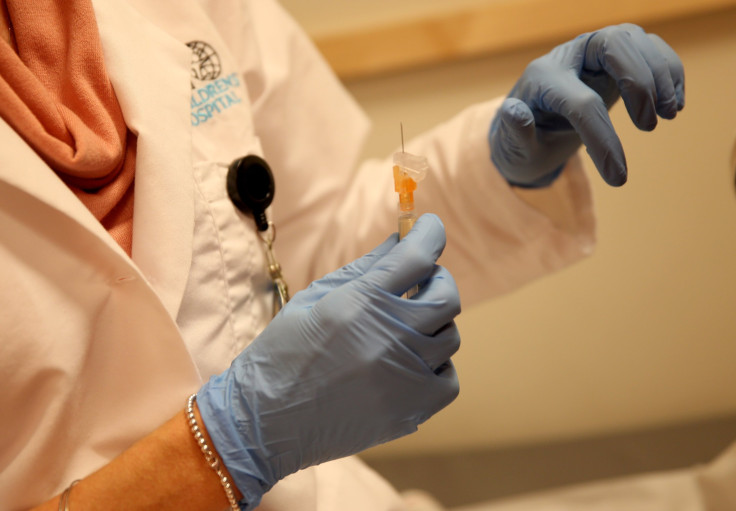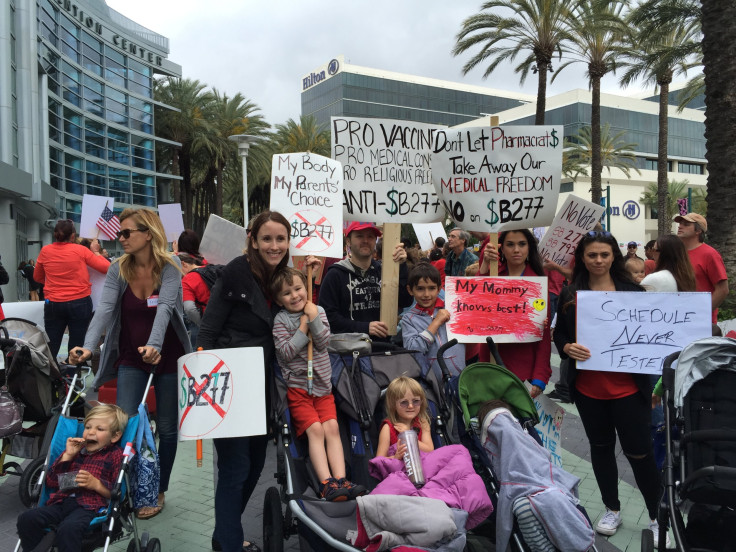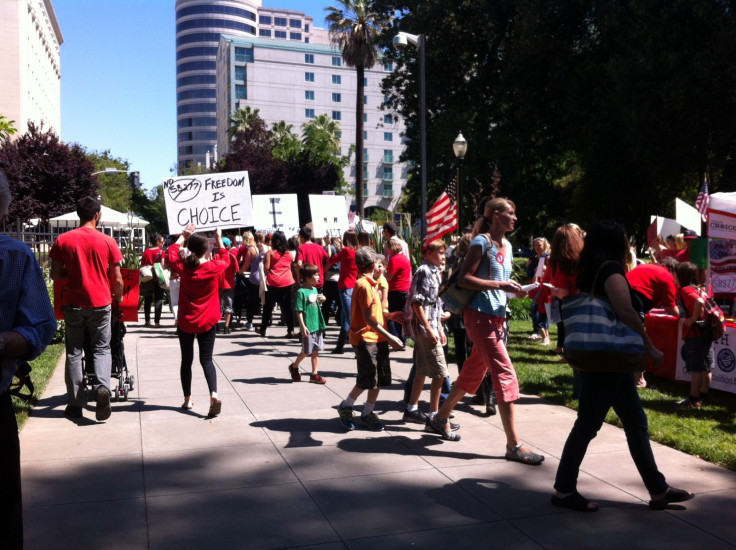California Vaccine Bill SB 277: Ban On Personal Exemptions Sparks Counter Movement Despite Recent Measles Outbreak

Until this year, Andrea Lewis hardly considered herself politically active. Then she heard about a bill that was introduced in the Senate in her home state of California. The bill, SB 277, presented in the midst of a national measles outbreak that originated in Disneyland, sought to boost vaccination rates by ending personal exemptions from immunizations. Unless a doctor indicated otherwise, all children would be required to get immunizations prior to entering kindergarten in public and private schools according to a schedule established by the U.S. government.
Lewis, who has a 3-year-old son, was struck by what she saw as a gross infringement on her rights as a parent. “I couldn’t not get involved,” she said. “It limits my own right to educate my children,” she said of the bill, because she wanted to vaccinate her son on a slightly different timetable. “It’s about choice and education and freedom.” Lewis, her colleagues and her friends coalesced into an informal network, devoting their spare time to participating in marches, meeting with legislators and sharing information about how they could prevent the bill from becoming law.
After the California Senate passed the measure last week by the wide margin of 25 -10, a multitude of both informal alliances and organized groups were gearing up for an even tougher battle as the bill made its way to the California State Assembly. Disparate in their views and a tiny minority of the state's population, Californians determined to kill the bill nevertheless represent what has been described as possibly the most strident outpouring of political dissent in recent memory and insisting, moreover, that their campaign is entirely grassroots.
“We will do whatever we need to do to be heard,” Lewis, who has publicly posted instructions on Facebook about how constituents can most effectively lobby Assembly members, said. She estimated that her network of people opposed to the bill had more than doubled in mass, from a few hundred to a few thousand, adding, “I’ve only seen our group growing.”

State Sen. Richard Pan first presented the bill to the California Senate in February. The measles outbreak, ongoing at the time, was officially declared over in April, but not before 131 people in California were sickened, along with 38 people in 19 other states. Measles is generally preventable with a two-dose vaccine, typically administered to children when they are about one year old and then again between the ages of four and six. The U.S. declared measles eliminated in 2000, but throughout the rest of the world, 146,000 people die from the virus every year.
During the recent outbreak in the U.S., the majority of those infected were not vaccinated against the virus, according to the Centers for Disease Control and Prevention. A growing movement of “anti-vaxxers,” or people who object to immunizations, were largely blamed for its spread and for compromising herd immunity -- when vaccinating a critical percentage of people protects an entire population against a disease. Herd immunity is crucial for people whose immune systems have been compromised, such as if they have cancer or other medical conditions and cannot be vaccinated for medical reasons.
Current California law allows parents to opt out of vaccinating their children for personal and religious reasons, not just medical ones. Overall, the state’s measles vaccination rate of about 91 percent is just slightly below the CDC’s ideal coverage of 92 to 94 percent, but in some pockets it drops far lower, with vaccination rates dipping to below 60 percent, due in part by parents who sought exemptions based on personal beliefs. SB 277 aimed at lifting these lagging vaccination rates and preventing another outbreak.
The Parent Lobby
Despite the argument for public health, a plethora of loose alliances and groups, many of whom include impassioned or even irate parents, have forged a formidable lobby aimed at ensuring the bill meets its demise in the state Assembly, where it could be taken up as early as June. Some of the bill’s opponents adhere to the thoroughly discredited claim that vaccines cause autism. Others regard it as interfering with their rights and choices not merely as parents but as Americans.
“Opponents still strongly believe that parents should have the right to opt out [of vaccinations],” Jack Pitney, a professor at Claremont McKenna University in Claremont, California and the author of a forthcoming book on the politics of autism, said. Even though a 1998 article claiming vaccines cause autism was retracted and its author stripped of his medical license, some parents of autistic children still believe there’s a connection.
“Usually the symptoms of autism become evident around a person’s second birthday, which is also around the time when you get the MMR [measles vaccine],” Pitney explained. “There’s a very powerful tendency to assume cause and effect, even though scientific research overwhelmingly demonstrates that there is no cause and effect.” For these parents, because the issue is a deeply emotional one, as activists they become “extremely intense,” Pitney said, while other parents also protest vaccination requirements on libertarian grounds.
Rebecca Estepp, a member of the umbrella group California Coalition for Health Choice, said that as an infant, her son reacted to a vaccine for hepatitis B; he later was diagnosed with autism. "Something went terribly wrong when my son was vaccinated," she said. "He hit all his milestones until around that age." When asked about the retracted 1998 study, she said it was "the most misunderstood study ever." Although Estepp objected to SB 277 because she said vaccines involve risks, other parents in the group “do not want the state of California telling them how to parent their children,” she said.
The coalition would be using good old-fashioned lobbying to convince Assembly members to vote against the bill, according to Estepp. They’d make phone calls, send emails and letters to legislators and visit the Capitol. “If there are hearings, we’re still going to show up. We’re going to be there,” Estepp said.
Another group, the Santa Cruz Vaccine Awareness and Health Coalition, would be “trying to educate the public” and “put the pressure on” by tabling and speaking everywhere from farmer’s markets to school boards to the state assembly, Mike Lelieur, a member, said. He said he wasn’t opposed to vaccination but rather that the bill violated his personal liberty. “The government should not be telling us what to do with my kids,” he said.
Will #California Pass Bill To Make #Vaccination Mandatory? http://t.co/yJ5sCkqf45 pic.twitter.com/ILnBpDASUo
- Counter Current News (@CCN_Updates) April 25, 2015
A Grassroots Issue?
Evidence of just how vocal this constituency has been is apparent in the automated answering service for the phone line to Sen. Pan’s Capitol office, which guides callers who want to discuss SB 277 to one line, and all others to a second extension. The office of another state senator who supported the bill, Carol Liu, received more phone calls about the vaccine bill than any other issue, including immigration.
Those who object to the bill insist that the planned barrage of phone calls, letters and emails to legislators, along with rallies and other activities to thwart it, is fully grassroots.

Lewis, the mother whom SB 277 spurred to activism, said she and her friends were volunteering their time and did not have any sources of funding, while Estepp said that California Coalition for Health Choice was an all-volunteer group funded by donations, mainly from parents.
On a page on the coalition’s website, one “donate now” button links to an online fundraising page for a campaign against SB 277 by a different organization, the California Chiropractic Association. As of May 20, the campaign had received more than $28,000 from 269 sources – an average of $104 per person. A scrolling list of donors showed a range amounts, from anonymous donations of $30 to $800 from a Bay Area chiropractic center.
At the top of the website for the California Chiropractic Association itself, a tab is nestled among rows of others: “Oppose SB 277.” The page, which says “there should be choice!” on vaccines, provides multiple links to “take action now!” and suggests that opponents of the bill sign petitions, send emails and handwritten letters to local representatives and request to meet them in person. It also has a section of “do’s and don’ts” for grassroots activities.
“That’s a grassroots campaign out of California,” Barbara Loe Fisher, president of the National Vaccine Information Center, which presents vaccines as risky and has supplied information publicly via Facebook about how Californians can contact lawmakers and urge them “VOTE NO on SB 277,” said. Fisher said her own organization was “funded by individual donations and family foundations,” which in 2013 amounted to $645,568, according to tax forms. One particular donor, the Dwoskin Family Foundation, which has given $263,000 to the center, has also funded research linking vaccines to autism, CNN has reported. Still, Fisher insisted simply that by posting instructions for Californians to contact legislators, “We make it easy for them to participate in our democracy.”
Other groups have come out against SB 277, even without campaigning so actively against it. The Arizona-based libertarian Association of American Physicians and Surgeons, for instance, has answered questions and provided testimony at parents’ request, according to Jane Orient, the association’s spokeswoman.
The California Coalition for Vaccine Choice, for one, calls the bill a measure for “forced vaccinations” and describes vaccines as “a risk-laden medical procedure.” And during a film screening in Sacramento in April, vaccine skeptic Robert F. Kennedy Jr. angered many with his description of autism as “a holocaust” caused by vaccines. He later apologized for his remarks but said nothing about the claim, fully discredited, on which he had based them.
Lewis was careful to state that she was not against vaccinating and that rather, “Vaccines are very important.” Still, she said, others “may lose sight of the value of vaccines.”
© Copyright IBTimes 2024. All rights reserved.






















